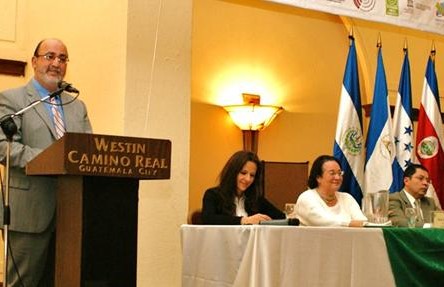
China’s Energy Experts
Who in China is advising on energy engagement with Latin America?
This post is also available in: Spanish
When we bake cookies there are two aspects of the process that are crucial: the oven temperature and the time it takes for the dough to finish baking. If the temperature is insufficient or the cookies do not remain in the oven long enough, surely we will have raw cookies.
According to the analogy of the cookies, the temperature at which we are baking refers to educational quality, and the baking time to the school year.
Compliance with the school calendar is essential for our students to move forward. Unfortunately in some countries, like mine – Guatemala -, the number of school days is rarely enough. However, such monitoring of compliance of school days, until now, had been difficult to substantiate.
As part of the project “Mejoremos Guate,” in collaboration with the citizen observatory “Alertos,” Empresarios por la Educación launched in mid-January the first system of citizen monitoring of school days. The aim of the project is that the citizens themselves (members of organizations and institutions, principals and teachers of the establishments, parents, etc.) voluntarily participate in quantifying school days of any center. The big goal is that by 2021, 100% of schools will meet the 180 school days per year established by law. Let’s not forget that if children, for reasons beyond their control, cannot attend school, they will find it difficult to develop the competencies, soft skills, and basic knowledge to cope with the demanding and competitive world in which we live today.
Many governments in Latin America are aware of this challenge; therefore, most of them establish 190-day school calendars, and even 200, by law. There are cases, such as Costa Rica, Uruguay, and Brazil, in which a very well-structured schedule is established such that it takes into account holidays and vacations, plus extra days to recover those that were lost.
On the other hand, there are some countries that in their legislation only establish calendars with a minimum of 180 days, which is the case in Guatemala, Argentina, and Mexico. 180 days does not mean improved learning, but it is the minimum time that experts recommend to cover the necessary content and for the child to acquire the knowledge specified in the relevant national curriculum. So the big question is: Are we leaving the cookies in the oven long enough?
In the case of Guatemala, the regulations of the National Education Act state that schools must teach 180 days a year. However, the school year is victim of petty theft of days caused by a myriad of reasons, such as national holidays, adverse weather conditions, road blockades, strikes of the union movement, and incidents in schools, among many others. To complicate matters, there is no systematic information on compliance of days at the national level or reliable monitoring by the authorities. Sometimes departmental supervisors provide information indicating that everything is in order, when in fact that is not the situation.
The discussion about the number of days – whether 180, 190 or 200 – has been part of a debate conducted by academics and educators worldwide, so I would not want to delve into it. I think that what should concern us all is the failure to meet the minimum number of days, whatever that number may be. Our countries and educational systems must comply with their respective applicable laws. Guatemala Visible, in partnership with Empresarios por la Educación, conducted monitoring during the first half of 2014 in 31 schools in 30 municipalities located in various departments such as Huehuetenango, Quiché, Jutiapa, Chiquimula, Totonicapán, and Suchitepéquez, among others. The collected data showed that, on average, during a period where 107 school days were supposed to be fulfilled, only 97 were actually fulfilled. The platform is innovative because it transfers the monitoring power to the citizens, thusavoiding this breach of law.
Until now, empowering parents to ensure their children were receiving the effective minimum 180 class days seemed to be an impossible task. Through this monitoring system, parents and private citizens become monitoring agents of education who have at their disposal an invaluable tool that not only helps them to take an active role in the education of children, but that also promotes the improvement of the entire system. In addition, on its behalf, the Ministry of Education can take advantage of this data to validate their internal controls.
The project for monitoring the compliance of school days has a map locating schools in the country, according to the list of schools authorized by the Ministry of Education. Volunteer monitors, registered or unregistered, can make their reports in three ways: (i) website of Empresarios por la Educación – https://www.empresariosporlaeducacion.org/ -, (ii) e-mail or (iii) text message from any cellphone.
The interface is quite simple: volunteers only need to enter the code or name of the establishment, followed by the words “closed” or “open,” and ending with a brief description of why the establishment is closed, if that were the case. With this information, the system automatically generates interactive maps on the status of schools about which reports have been submitted, each represented graphically by a dot. Schools that do not have reports appear in gray dots, those that have remained open appear in green, those that have been closed recently appear in yellow, and those that have been closed for many days appear in red.
Undoubtedly, this is an initiative with great potential, replicable in any country in Latin America facing the same challenge. The platform is an unprecedented experiment in citizen participation that can activate a whole society and create awareness, while involving citizens in the improvement process. Let’s remember that what one does not measure, does not improve. This platform is a tool that allows Guatemala to be a pioneer in educational monitoring. Ensuring effective classroom days is only the first variable that we can influence to improve the education of our children, which is the basis for sustainable and inclusive development. If all citizens actively get involved in this project, I am sure Guatemala will advance at a faster pace towards becoming the country about which we all dream.
Salvador Paiz is a member of the Inter-American Dialogue and of the Commission for Quality Education for All. You can visit his website www.salvadorpaiz.com and follow him on Twitter @salva_paiz
Who in China is advising on energy engagement with Latin America?
Summary of PREAL’s recent international conference on teacher effectiveness, held in Guatemala City.
Links to agenda and media coverage of a conference on the state of the teaching profession in Guatemala.
